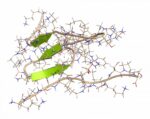NIH $2M Grant Supports Work Into Chronic Stress and Alzheimer’s
Written by |

The National Institutes of Health (NIH) awarded $2 million to investigators studying how chronic physiological stress may cause vascular changes and exacerbate the cognitive decline seen in Alzheimer’s disease.
Paul Chantler, PhD, an associate professor at West Virginia University School of Medicine, and his team are also using animal models to investigate how xanthine oxidase — a naturally occurring enzyme — can contribute to cellular stress and possibly damage blood vessels in the brains of Alzheimer’s patients.
“[The] NIH wanted to prioritize examining the vascular contributions to dementia. That’s where my research fits in well,” Chantler said in a university press release.
Alzheimer’s disease has long been associated with beta-amyloid plaques and tau tangles. But other factors are thought to be at play with regard to disease progression.
“Billions of dollars have been spent looking specifically at how amyloid tangles, tau and plaque processes in the brain contribute to dementia,” Chantler said. “The research has done really well in animal models, but when it made it to clinical trials, it’s fallen flat on its feet.”
Chantler and colleagues will work on identifying the specific effects of chronic stress in disease progression. “Can we … use stress to accelerate the pathology of dementia?” Chantler said. “We think that we can.”
They then will use a medication to block the xanthine oxidase pathway, and test whether this inhibition helps to maintain the health of blood vessels in the brain. Xanthine oxidase is a type of enzyme that produces reactive oxygen species, harmful molecules that can lead to cell damage and death.
Researchers will also investigate if a combination of the two approaches — that is, reducing stress and using a xanthine oxidase inhibitor — can lead to greater improvements than either approach alone.
“If you know stress is a risk factor for dementia, then obviously you try and alleviate that stress … But, also, the drugs we’re using to block xanthine oxidase currently seem to prevent the vascular dysfunction that we see with dementia,” Chantler said.
The question to be answered, he added, is “if we reduce stress and use the drug, do we have double the beneficial effect?”
This work could lead to new therapies for preserving memory and cognitive function in people with Alzheimer’s, as well as those at risk of developing the disease.
“The overall goal of these studies is to determine the etiology [cause] of the stress-related [xanthine oxidase] and pro-inflammatory changes in mediating [vascular damage], and its progression to [Alzheimer’s] pathology,” the researchers wrote in their NIH grant proposal. “The studies will fill gaps identified by the NIH regarding the need for understanding of vascular contributions to cognitive impairment and dementia.”






